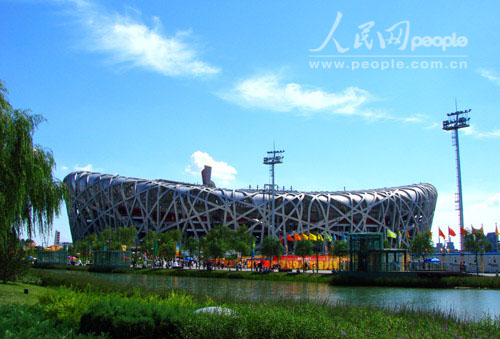 The 4th Chinese National Pole Dance Championship held in Tianjin
The 4th Chinese National Pole Dance Championship held in Tianjin
 Chinese navy commandos debut at 2014 RIMPAC
Chinese navy commandos debut at 2014 RIMPAC
 Guangxi impression: scenic countryside
Guangxi impression: scenic countryside
 World's largest aquatic insect found in Sichuan
World's largest aquatic insect found in Sichuan
 Ceremony volunteers for Youth Olympics make public appearance
Ceremony volunteers for Youth Olympics make public appearance
 A glimpse of female crew of Liaoning aircraft carrier
A glimpse of female crew of Liaoning aircraft carrier
 Stills from "Dad, where are we going?"
Stills from "Dad, where are we going?"
 Legless man's happy life
Legless man's happy life
 Top ten most beautiful islands in China
Top ten most beautiful islands in China
 Aerial view of Hong Kong
Aerial view of Hong Kong
 |
| The Bird’s Nest in Beijing (people.com.cn) |
Sports venues that were built for the 2008 Beijing Olympics are in good condition and could be used for the 2022 Winter Olympics, a way to cut expenses should the Chinese capital host the event, officials and experts said.
The venues have been well-cared for, and have seen a lot of use and wide popularity with visitors, said Jiang Xiaoyu, vice-chairman of the Beijing Olympic City Development Association.
China used 11 permanent venues for the 2008 Olympic Games. Four are in universities and two are used for professional training in biking and shooting. The five others are new structures, including the National Stadium, commonly known as the Bird’s Nest, and the National Aquatics Center, also known as the Water Cube.
The university and training facilities have seen regular use by students, residents and professional athletes, while the others have become popular locations for commercial performances, Jiang said.
Of the five venues managed by companies, the Wukesong Indoor Stadium, the basketball stadium in the 2008 Olympic Games, made a strong transition from Olympics venue to private enterprise.
Wang Shuxia, manager of the company that runs the stadium, said the stadium got title sponsorship in 2011. Then the managing company cooperated with a top foreign venue operator to change the profit model from relying on site rental to events and other businesses that require high-quality facilities.
In 2013, the stadium hosted 131 sports and entertainment events, attracting more than 1 million visitors, she said.
The Bird’s Nest also holds various activities such as three months of ice sports in winter.
Some pictures of shabby and deserted venues used in the Beijing Olympic Games have been exposed during the past few years. Jiang said they were all temporary venues, which were designed to be demolished after the games.
“Some of them remained because management did not keep up with the removal project,” he said, adding that the reuse of the areas where venues are located may involve many companies or departments, and therefore take time to complete.
For the bid for the Winter Olympic Games of 2022, Jiang said the country could use its existing legacy from 2008.
The scale of the Winter Olympics is much smaller than the Summer Games, making it possible to have the games in a frugal and sustainable style, said Wei Jizhong, former secretary-general of the Chinese Olympic Committee.
The bidding committee said new venues to be built would include a stadium with a long-distance speed skating rink in Beijing, and ski slopes for alpine skiing, bobsledding and skeleton events in Beijing’s Yanqing county. Other ski events would be held in Chongli county in Zhangjiakou, Hebei province, with refurbished facilities in four major ski resorts.
 Blockbuster? No, it’s firefighters’ posters
Blockbuster? No, it’s firefighters’ posters
 Special 'gifts' for IT men for Chinese Qixi Festival
Special 'gifts' for IT men for Chinese Qixi Festival
 Foreign students' colorful life in China
Foreign students' colorful life in China
 French photographer‘s work 'China 2050' goes viral online
French photographer‘s work 'China 2050' goes viral online A bite of Halal Food
A bite of Halal Food
 Dressed in uniforms to marry you
Dressed in uniforms to marry you
 Female soldier in Chinese special force
Female soldier in Chinese special force
 Zhujiang ambassadors attend lotus lanterns activity
Zhujiang ambassadors attend lotus lanterns activity
 From girly girl to tough special police officer
From girly girl to tough special police officer
 22-year-old veteran travels around China
22-year-old veteran travels around China
 Night scenery of pagoda forests
Night scenery of pagoda forests China suffers from hot summer
China suffers from hot summer 48 hours after super Typhoon Rammasun
48 hours after super Typhoon Rammasun German pianist plays mid-air ‘magic carpet’ show over Munich Airport
German pianist plays mid-air ‘magic carpet’ show over Munich Airport
 China's manned deep-sea submersible conducts dive in Pacific Ocean
China's manned deep-sea submersible conducts dive in Pacific Ocean
Day|Week|Month